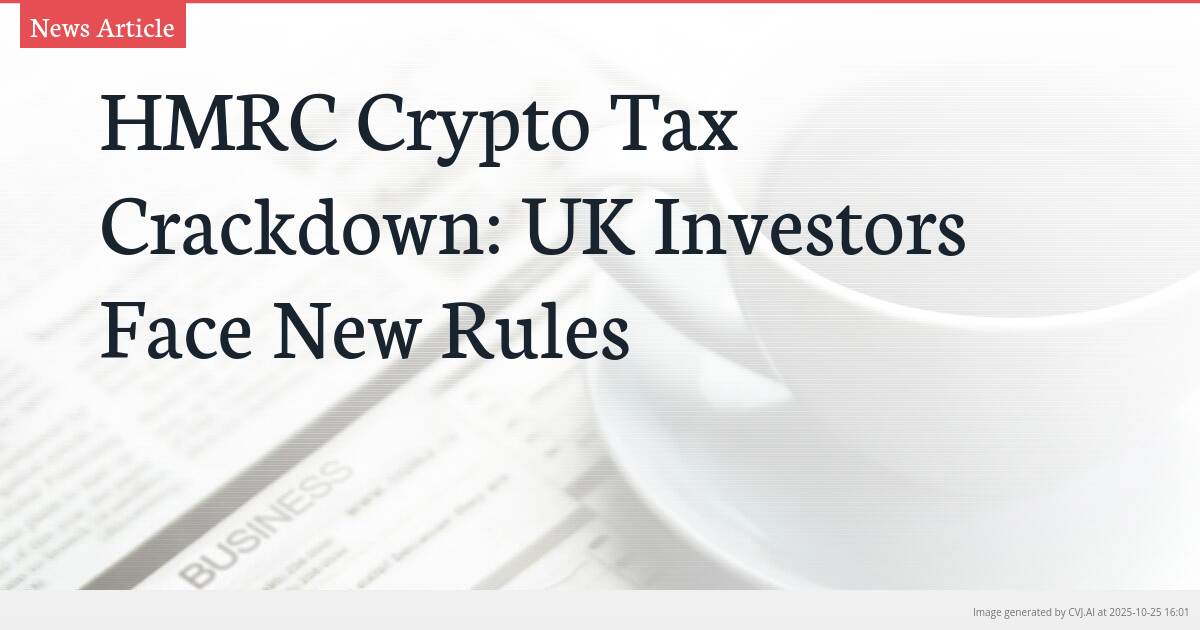This summary text is fully AI-generated and may therefore contain errors or be incomplete.
Introduction
UK cryptocurrency investors can no longer ignore their tax obligations as HMRC intensifies its crackdown on unreported gains. New data-sharing powers and reduced capital gains thresholds mean even small transactions now fall under tax scrutiny. The era of crypto tax myths has officially ended.
Key Points
- Any crypto disposal—including token swaps, spending, or gifting—now triggers capital gains tax under HMRC's updated guidance
- Major exchanges must share customer transaction data with HMRC under international CARF reporting standards adopted by G7 nations
- The capital gains tax allowance has been reduced to £3,000 for 2024/25, down from £12,300 in 2022/23, bringing more investors into filing territory
The End of Crypto Tax Misconceptions
For years, many UK crypto holders operated under the mistaken belief that digital assets existed outside the country’s tax regime, particularly convincing themselves that tax only applied when converting cryptocurrency to pounds. This comforting misconception has now been definitively dismantled by HMRC’s updated guidance. Under the tax authority’s definition, any disposal of crypto—whether converting to another token like Bitcoin or Ethereum, spending it on goods and services, or even gifting it to someone else—can trigger capital gains tax liability.
The distinction between capital gains and income tax catches many investors off guard, particularly those active in DeFi trading or NFT flips. As clarified by tax professionals, activities such as staking, yield farming, receiving airdrops, being paid in crypto, or mining all count as income rather than capital gains. This means a single swap on platforms like Uniswap or a series of NFT transactions could now fall squarely within HMRC’s crypto tax remit, regardless of whether traditional currency was involved.
Enhanced Surveillance Through Data Sharing
HMRC’s enforcement capabilities have undergone a quiet transformation through international cooperation. Under the OECD’s Crypto-Asset Reporting Framework (CARF), adopted by the UK in alignment with other G7 nations, major cryptocurrency exchanges including Coinbase, Kraken, and Binance UK must now share comprehensive Know-Your-Customer (KYC) and transactional data directly with tax authorities.
This international information-sharing framework means exchanges are already transmitting customer data to HMRC, effectively ending the era of anonymous wallets linked to email aliases. The agency now possesses the technical means to match wallet addresses to taxpayer records, and UK tax professionals confirm HMRC is preparing to use exchange-reported KYC data to cross-check taxpayer filings. This enforcement mechanism is currently being piloted with selected crypto platforms as CARF implementation progresses.
The Squeeze on Capital Gains Allowance
Until recently, investors could rely on a generous capital gains allowance to remain below HMRC’s reporting threshold. However, for the 2024/25 tax year, the CGT allowance has been dramatically reduced to just £3,000, down from £12,300 in 2022/23. This reduction means even modest percentage swings in Bitcoin or Ethereum values can now push holders into crypto tax filing territory.
The lowered threshold matters significantly because crypto gains often compound across dozens of small transactions. A few token swaps on Ethereum’s network or a minor sell-off following a market rally could easily exceed the revised £3,000 allowance. Tax advisers report fielding increasing numbers of calls from investors who’ve realized, often too late, that every exchange and token switch was potentially taxable under the new regime.
Severe Penalties for Non-Compliance
For investors who assume a warning letter represents the worst-case scenario, HMRC’s penalty regime delivers a harsh reality check. Failure to report crypto gains or income can result in financial penalties ranging from 10% to 200% of the tax owed, depending on whether the oversight is deemed careless, deliberate, or deliberately concealed.
In cases where evasion is proven, HMRC can bring criminal charges under the Cheating the Public Revenue offence, carrying potential imprisonment. Additionally, a flat £300 fine applies to those who fail to provide required personal or KYC details to exchanges under new reporting rules coming into force in 2026. HMRC’s data-driven approach means investors who haven’t been declaring gains will find it increasingly difficult to remain undetected.
A Wake-Up Call for Retail Investors
HMRC has made its intentions unmistakably clear through proactive enforcement measures. The tax authority has already launched ‘nudge’ campaigns, sending tens of thousands of letters to crypto investors suspected of underreporting gains. Tax professionals across London report a significant surge in crypto tax-related queries as retail investors scramble to reconcile years of DeFi activity and forgotten exchange accounts before the current tax year closes.
The compliance message is unambiguous: the grace period for ‘not knowing’ has ended. HMRC’s access to exchange data, combined with the narrower CGT allowance, means even occasional traders are squarely within scope. What was once dismissed as magic internet money beyond government reach now faces the same scrutiny as traditional investments. For UK investors holding Bitcoin, Ethereum, or other digital assets, the window to achieve compliance is narrowing rapidly, and this time, ignorance will not provide protection from consequences.
📎 Read the original article on cryptoslate.com

